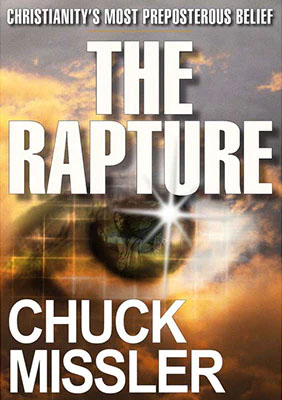The more we take the Bible seriously, and the more we study the Bible as a whole, the clearer it becomes that the Rapture is an essential ingredient in God’s plan.
Most people assume that the future is but a linear extrapolation of the present; life will just go on. Our society adheres to views of uniformity and the eternity of nature. But the Bible says otherwise. A stunning event is coming—an event which cannot be denied by clever detractors or contradicted by coy pretenders.
It may seem bizarre that in some indeterminate moment, true believers in Christ will be taken up, snatched literally out of this world while the rest of humanity continues on living their lives on earth. In fact, the idea of a mass Rapture is considered by many to be the most preposterous belief held by Christians.
At the same time, it is the Blessed Hope of many Christians today, that they might actually be part of an historical phenomenon the likes of which the world has never seen.
What does this mean? How could God selectively translate a massive number of people all in one instance into another realm and again, selectively, leave others behind?
I’m fond of a quote by Dr. Richard Feynman, a professor at Cal Tech speaking of quantum physics, who said:
I think it’s safe to say that no one understands quantum mechanics. In fact it is often stated, of all the theories proposed in this century; the silliest is quantum theory. Some say that the only thing quantum theory has going for it, in fact, is that it is unquestionably correct.
By comparison, the only thing going for this Biblical idea of the Rapture is that it’s unquestionably correct. The more we take the Bible seriously, and the more we study the Bible as a whole, the clearer it becomes that the Rapture of the Church worldwide is an essential ingredient in God’s plan.
The key passage is in Paul’s first letter to the Thessalonians:
For if we believe that Jesus died and rose again, even so them also which sleep in Jesus will God bring with him. For this we say unto you by the word of the Lord, that we which are alive and remain unto the coming of the Lord shall not prevent them which are asleep. For the Lord himself shall descend from heaven with a shout, with the voice of the archangel, and with the trump of God: and the dead in Christ shall rise first: Then we which are alive and remain shall be caught up together with them in the clouds, to meet the Lord in the air: and so shall we ever be with the Lord. Wherefore comfort one another with these words.
That’s quite a statement! We understand that He’s going to come with a shout to gather His Bride. But how will He do that? In verse 17, Paul describes how those of us who are alive will be “caught up” to meet Christ in the air, transposed in the twinkling of an eye.[1] The Greek word for “rapture” is harpazo, which means “caught up.”
Quite often, references to this passage end with verse 17, but I think verse 18, “Wherefore comfort one another with these words,” is very much a part of the Rapture declaration.
It’s important to understand that when Paul addressed this church, he found they were upset because some of their friends or relatives had died, and they were worried that those who had died would not see the return of Christ.
Paul had to address their misperception. When he spoke of those “which sleep in Jesus,” he referred to dead believers, and he said that just as we believe He died and rose again, we believe He will resurrect those beloved friends and family when He comes!
Does the Word “Rapture” Appear in the Bible?
Some argue against the Rapture by saying the word doesn’t even appear in the Bible, but it does. We have to read it in the Vulgate, the Latin version of the Bible. There the Greek word harpazo is translated rapiemur, the proper tense of rapio, the root of our English words “rapt” and “rapture.”
Deinde nos qui vivimus qui relinquimur simul rapiemur cum illis in nubibus obviam Domino in aera et sic semper cum Domino erimus.
— 1 Thessalonians 4:17 (Latin Vulgate)
“Rapture” comes from the past participle of the verb rapia. One cannot deny that the word appears in the appropriate tense as literally “rapture” in the Latin Vulgate. Those who say it’s not in the Bible have not done their homework.
References to the Rapture in the Bible
There are seven references to the Rapture in the Bible. Don’t forget the Old Testament is full of types, which foretell events in the New Testament and what will occur yet in the future.
- Enoch was raptured, according to Genesis 5:24, and confirmed by Hebrews 11:5.
- Elijah was taken up in 2 Kings 2:11.
- Jesus Himself, after He was physically resurrected, and after He was seen alive, walking, talking and eating, being touched and handled, He Himself was taken up in a moment of glory (Acts 1:9–10).
- Phillip was carried away in Acts 8:39.
- Paul was taken up to the Third Heaven in 2 Corinthians 12:2.
- John was caught up to Heaven in Revelation 4:1.
The Woman of Revelation 12
These six are all familiar references to readers of the Bible. Four of these references use the Greek word harpazo. The seventh and most provocative use of harpazo is in Revelation 12, where we see Israel portrayed as a woman who gives birth to the man-child, the Messiah.[2] Some people interpret the Woman as the Church, but that doesn’t work because the Church is a virgin, and this woman is giving birth.
The picture of the man-child is derived from idioms drawn from Genesis. In Genesis, God created Eve, the woman, out of one of Adam’s ribs. The woman in Revelation 12 is clearly not the bride or wife, but the Mother who brings forth the man-child who was to rule all nations with a rod of iron. Psalm 2:9 and Revelation 19:15 identify this man-child as the Messiah, as Jesus Christ.
The woman’s child is “caught up” to God unto His Throne, and so Jesus sits at the right hand of God the Father, who is in fact the Right Hand of the Triune God. From Genesis to Revelation we learn about this man-child, the child who is the Beginning and the End.[3]
Whenever I read Revelation 12:5 as a kid, I presumed that the harpazo of the man-child referred to the Ascension, and that may be. English theologian G.H. Pember, however, suggested the possibility that this verse in fact portrays the catching up of the Body of Christ, of the Church itself. It’s certainly interesting that the word used in this reference is harpazo, the same word we see in 1 Thessalonians chapter 4. The Church will be removed as suddenly and as mysteriously as it began.
There has never been a more exciting time to indulge in a serious study of this subject. I am one of many Bible scholars who believe we are on the threshold of the most climactic era of all time. We appear to be entering a period of time about which the Bible says more than any other time in history, including the time when Jesus walked the shores of the Sea of Galilee and climbed the mountains of Judea. This classic Biblical scenario, long espoused by those that take the Bible seriously, may soon be subjected to a decisive empirical test.
[This article has been excerpted from our newest eBook release, The Rapture.]







